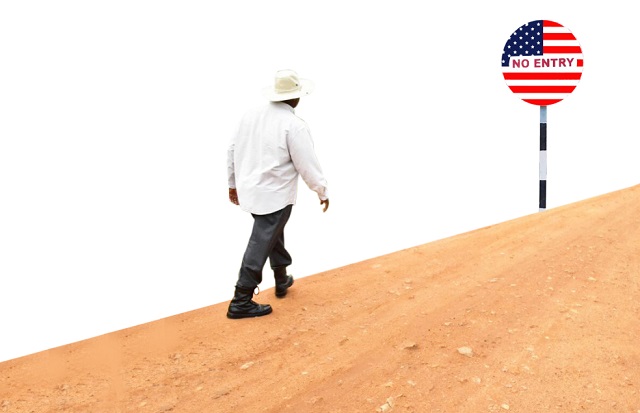
Why it doesn’t matter and why all eyes should be on 2022 US-Africa Summit
Kampala, Uganda | THE INDEPENDENT | After missing an invite to the just concluded `Democracy Summit’ hosted by U.S. President Joe Biden on Dec.9-10, President Yoweri Museveni’s team is possibly hoping to be at the next one. But that too is uncertain, according to analysts.
U.S. President Joe Biden will host the second US-Africa Leaders Summit in 2022, the White House announced on Nov. 19 in a statement.
The Summit is part of the Biden Administration’s commitment to revitalising global partnerships and alliances.
“Democracy doesn’t happen by accident. We have to defend it, fight for it, strengthen it, renew it,” Biden has said since taking office.
He has committed to “make democracies more responsive and resilient, and to build a broader community of partners committed to global democratic renewal.”
The US-Africa Leaders Summit 2022 will focus on strengthening relations with African partners based on principles of mutual respect and shared interests and values, a statement announcing it said.
“It will also serve as an opportunity to listen to and collaborate with African counterparts on key areas the United States and Africa define as critical for the future of the continent and our global community,” read the statement.
Uganda has recently suffered from unfavourable relations with the U.S. over declining democratic credentials. Museveni’s image was damaged by reports of voter intimidation and violence against the opposition during the presidential election in January.
Fueling some of the criticism is an active influence campaign by Bobi Wine’s Washington lobbyist Jeffrey Smith, whose firm Vanguard Africa has represented the Ugandan musical artist-turned-politician pro bono since 2018.
In reaction, Museveni’s government retained the services of a top Washington lobbying firm, London-based Mercury International UK Ltd, to help reset U.S. relations.
Smith reacted immediately.
“Like clockwork,” Smith tweeted. “Dictatorship rigs election, kills the opposition, becomes increasingly violent. Then, the backlash from foreign capitals, NGOs and media. Instead of reform, they spend money on a lobby firm.”
London-based Mercury International UK Ltd has sub-contracted the U.S.-based Mercury Public Affairs. The government of Uganda is paid for “strategic consulting, government relations, lobbying, and media relations consulting and management services”.
Mercury has previously represented the Ugandan government in 2014-2015. While the contract stipulates lobbying to promote trade and investment, disclosures under the Foreign Agents Registration Act (FARA) show the firm also lobbied the State Department and the Senate Foreign Relations Committee on “security relations, human rights and congressional delegations.
In addition, Scribe Strategies and Advisors has lobbied for the Ugandan government since 2015. Firm founder Joseph Szlavik and consultant Alexander Beckles are registered as foreign agents on the account.
The contract with Mercury UK runs from April 22 to May 21 and renews automatically every month until terminated. The point of contact for the Ugandan government is Proscovia Nalweyiso, a senior presidential adviser and lieutenant general in the UPDF.
Uganda’s ambassador to Washington, Mull Sebujja Katende, told Foreign Lobby Report that the lobbying aims in part to challenge the narrative from rights groups and supporters of rival candidate Bobi Wine that the government violently suppressed the opposition to ensure Museveni a sixth term in office.
“Certainly we are not in the best of shape with regard to the way we are understood here in Washington,” Katende said. “And it is in our interest to tell those authorities the truth of what’s happening in Uganda.”
The U.S Congress and Biden administration have been reassessing the U.S. relationship with Uganda, an important counter-terrorism ally in East Africa and major beneficiary of health and security assistance.
Katende, the ambassador, said much of the criticism aimed at the country was due to coronavirus-related restrictions during the election that had been “misconstrued.” He said the elections were “free and fair” and Wine and his supporters want to sow doubt about them because he lost.
“The problem we are dealing with is there are so many interest groups that are trying to misguide (the U.S. government),” he said. “They want to nullify the elections because they want to provide alternate leadership. That is not how things should work.”
But in an ominous sign, the U.S. on Dec.02 imposed sanctions on the head of the Chieftaincy of Military Intelligence (CMI), Maj. Gen. Abel Kandiho over alleged human rights abuses.
Kandiho was hit with the sanctions over alleged human rights abuses, including for alleged torture and sexual abuse committed under his watch.
“Treasury will continue to defend against authoritarianism, promoting accountability for violent repression of people seeking to exercise their human rights and fundamental freedoms,” Andrea Gacki, director of the Treasury’s Office of Foreign Assets Control, said in the statement.
The action freezes any U.S. assets of those blacklisted and generally bars Americans from dealing with them.
The Kandiho sanctions follows others announced the State Department on April 16 on unnamed Ugandan officials for their alleged role in “undermining the democratic process in Uganda, including during the country’s Jan. 14 general elections and the campaign period that preceded it.”
The statement said Ugandan security forces were responsible for killing dozens of opposition protesters and bystanders.
“The Government of Uganda must significantly improve its record and hold accountable those responsible for flawed election conduct, violence, and intimidation,” Secretary of State Antony Blinken said in a statement announcing the measures.
“The US Government will continue to evaluate additional actions against individuals complicit in undermining democracy and human rights in Uganda, as well as their immediate family members.”
The post Museveni out of U.S. democracy summit appeared first on The Independent Uganda:.
from The Independent Uganda: https://ift.tt/3lZEFrk
0 Comments